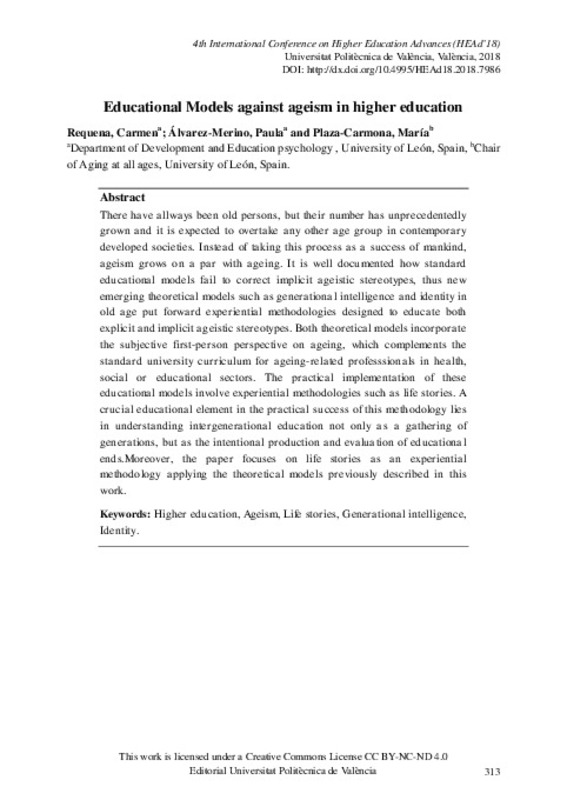JavaScript is disabled for your browser. Some features of this site may not work without it.
Buscar en RiuNet
Listar
Mi cuenta
Estadísticas
Ayuda RiuNet
Admin. UPV
Educational Models against ageism in higher education
Mostrar el registro sencillo del ítem
Ficheros en el ítem
| dc.contributor.author | Requena, Carmen
|
es_ES |
| dc.contributor.author | Álvarez-Merino, Paula
|
es_ES |
| dc.contributor.author | Plaza-Carmona, María
|
es_ES |
| dc.date.accessioned | 2018-10-05T12:54:03Z | |
| dc.date.available | 2018-10-05T12:54:03Z | |
| dc.date.issued | 2018-07-02T12:54:03Z | |
| dc.identifier.isbn | 9788490486900 | es_ES |
| dc.identifier.issn | 2603-5871 | |
| dc.identifier.uri | http://hdl.handle.net/10251/109634 | |
| dc.description.abstract | [EN] There have allways been old persons, but their number has unprecedentedly grown and it is expected to overtake any other age group in contemporary developed societies. Instead of taking this process as a success of mankind, ageism grows on a par with ageing. It is well documented how standard educational models fail to correct implicit ageistic stereotypes, thus new emerging theoretical models such as generational intelligence and identity in old age put forward experiential methodologies designed to educate both explicit and implicit ageistic stereotypes. Both theoretical models incorporate the subjective first-person perspective on ageing, which complements the standard university curriculum for ageing-related professsionals in health, social or educational sectors. The practical implementation of these educational models involve experiential methodologies such as life stories. A crucial educational element in the practical success of this methodology lies in understanding intergenerational education not only as a gathering of generations, but as the intentional production and evaluation of educational ends. The paper exemplifies these methodologies and contrasts their success in dealing with the complexities involved in educating against explicit and implicit agesitic stereotypes in intergenerational relations. Therefore, the key to intergenerationality lies less in its "generational" element as in its "inter" element. | es_ES |
| dc.description.uri | http://ocs.editorial.upv.es/index.php/HEAD/HEAD18 | es_ES |
| dc.language | Inglés | es_ES |
| dc.publisher | Editorial Universitat Politècnica de València | es_ES |
| dc.relation.ispartof | 4th International Conference on Higher Education Advances (HEAD'18) | |
| dc.rights | Reconocimiento - No comercial - Sin obra derivada (by-nc-nd) | es_ES |
| dc.subject | Higher Education | es_ES |
| dc.subject | Learning | es_ES |
| dc.subject | Educational systems | es_ES |
| dc.subject | Teaching | es_ES |
| dc.subject | Ageism | |
| dc.subject | Life stories | |
| dc.subject | Generational intelligence | |
| dc.subject | Identity | |
| dc.title | Educational Models against ageism in higher education | es_ES |
| dc.type | Comunicación en congreso | es_ES |
| dc.type | Capítulo de libro | es_ES |
| dc.identifier.doi | 10.4995/HEAD18.2018.7986 | es_ES |
| dc.rights.accessRights | Abierto | es_ES |
| dc.description.bibliographicCitation | Requena, C.; Álvarez-Merino, P.; Plaza-Carmona, M. (2018). Educational Models against ageism in higher education. Editorial Universitat Politècnica de València. 313-320. https://doi.org/10.4995/HEAD18.2018.7986 | es_ES |
| dc.description.accrualMethod | OCS | es_ES |
| dc.relation.conferencename | Fourth International Conference on Higher Education Advances | es_ES |
| dc.relation.conferencedate | Junio 20-22,2018 | es_ES |
| dc.relation.conferenceplace | Valencia, Spain | es_ES |
| dc.relation.publisherversion | http://ocs.editorial.upv.es/index.php/HEAD/HEAD18/paper/view/7986 | es_ES |
| dc.description.upvformatpinicio | 313 | |
| dc.description.upvformatpfin | 320 | |
| dc.type.version | info:eu-repo/semantics/publishedVersion | es_ES |
| dc.relation.pasarela | OCS\7986 | es_ES |








